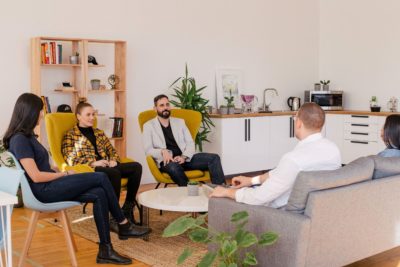Over the past eight months, I had the privilege of working at The Fountain Hill Center for my final internship placement in clinical social work. I first heard about Fountain Hill from Dr. Jessica Gladden, one of my instructors at WMU who also practices at Fountain Hill. During her course on Secondary Traumatic Stress, our learning focused on the importance of intentionally stewarding our physical, emotional, mental and spiritual resources in our work as mental health clinicians, not only to serve our clients well, but also to cultivate a practice of self-care necessary to avoid the burnout and secondary traumatic stress that is common in our field. Jessica’s description of the culture at Fountain Hill that created and encouraged opportunities for this kind of stewardship in a real practice setting was compelling.
Fountain Hill’s internship program is an important part of their mission to make counseling services affordable and accessible to all, as interns provide counseling at significantly reduced rates. Fountain Hill’s commitment to training the next generation of therapists is evident in the way Executive Coordinator Amy Van Gunst operates the program. As an intern at Fountain Hill, I was encouraged and empowered to make many of the decisions about how I wanted to work with my clients, just as I will in future practice as a licensed clinician. Amy created space in our Supervision time to work through ideas and hypotheses, to ask questions about where we felt stuck, to get valuable feedback on how our own self was showing up in our work with clients, and the importance of using that as a resource.

Boundaries Group
In the final months of my internship, I worked together with fellow intern Abby Deevers to facilitate a therapy group focused on boundaries in relationship. Boundaries operate in every area of our lives, whether we are aware of them or not. A boundary, according to Brené Brown, is “simply what is and is not ok.” Every time we make choices, or say “yes” or “no”, we are setting boundaries. Healthy boundaries are aligned with our preferences and values, while unhealthy boundaries are evidence of where we have lost connection to our authentic self, and respond out of fear or obligation, feeling like we have little choice.
One of the activities we did in group was based on Dr. Gabor Maté’s teachings on authenticity and attachment. He proposes that we are all born with an innate sense of boundaries or preferences, and we communicate these even at a very young age – think of the child who hides behind her mother at her mother’s insistence that she give grandpa a hug. Her authentic self feels a “no” in that moment, but she learns that in order to stay attached to her mother, who she needs for survival, she must say “yes.” Reconnection to our self and our boundaries is a process of attending to moments where we don’t say “no”, even when there is a “no” inside us that wants to be said, and recognizing that we can make different choices today as adults.
I am so grateful for the incredible opportunity I had to intern at Fountain Hill Center, and the excellent experience it offered to prepare me to enter the field as a professional.
Written by Janet Stark, Intern
June 9, 2022
